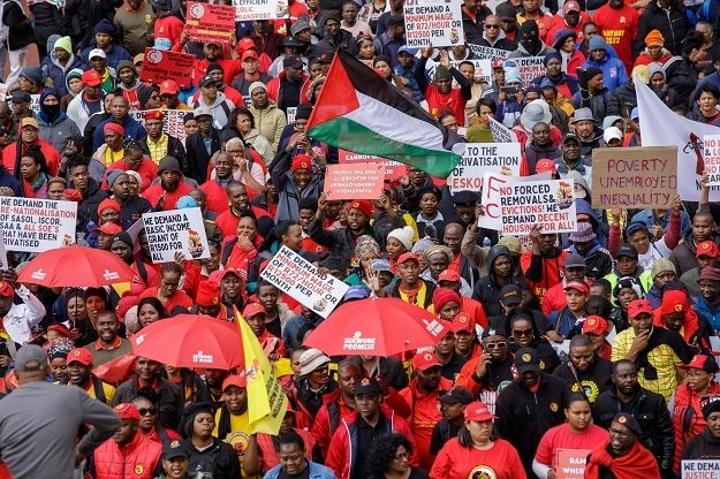Africa-Press – South-Africa. The South African Federation of Trade Unions (Saftu) said its national shutdown on Wednesday alongside the Congress of South African Trade Unions (Cosatu) was just the beginning of worker mobilisation against South Africa’s dire economic state.
The national shutdown was in protest against load shedding, unemployment, and the rising cost of living.
Shutdown activities in Cape Town on Wednesday saw a small crowd of a few hundred protesters. Saftu blamed this on dysfunctional public transport.
Who, why, when and where: A quick guide to the Saftu-Cosatu national shutdown
While Saftu secretary-general Zwelinzima Vavi looked to manage expectations on the size of the crowd, saying he did not expect record-breaking numbers in attendance, the limited impact on the economy and the working day showed that even his call for workers to stay home was not widely heeded.
Saftu marched to the Cape Town terminal and handed over a memorandum to the Passenger Rail Agency of South Africa (Prasa), demanding that the entity invest in trains and bolster security for its infrastructure.
Protesters then marched to the Cape Town city council and demanded that the municipality improve service delivery to the city’s poorest communities. The federation concluded its shutdown in Cape Town outside Parliament.
Tshwane
Meanwhile, in Tshwane, union members marched to the Union Buildings where a memorandum was handed over to Minister in the Presidency Mondli Gungubele.
While the march started with no more than 300 people, it later grew as the crowds made their way to the Union Building lawns and between 2 000 and 5 000 people eventually turned up for the protest.
Cosatu leaders said they were happy with the turnout. Before addressing the crowds, there appeared to be a spat between Saftu and Cosatu leaders over how the programme would be run.
At one point Saftu gathered separately from Cosatu and its affiliated unions. Eventually, the unions merged and the crowds were addressed.
As each speaker took the podium, the message was the same: the ANC government had failed the working class and the cost of living was too high.
Back in Cape Town, Saftu president Ruth Ntlokotse said the federation demanded that the government increased the national minimum wage to R72 per hour, introduced a basic income grant of R1 500, and scrapped the government’s 2% wage increase offer at the ongoing public service wage talks.
They also demanded that the government filled all vacancies in schools, hospitals, and police stations. The federation demanded a cap on fuel prices, and interest rate hikes.
“We need to wage our struggles in different forms. We are now handing over our demands. These are our demands from Saftu and its affiliates and the working class. We will allow Parliament to receive the memorandum and give them seven days to respond,” said Ntlokotse.
READ | Cosatu plans strike next week against load shedding, rising prices
Cosatu shrugged off a statement by the Department of Public Service and Administration that the government would apply a “no work, no pay” policy on public servants who participated in Wednesday’s national shutdown.
The department released a statement saying public servants whose work constituted an essential service would not be allowed to participate in the stay away or any kind of demonstrations during office hours, nor would they be granted leave to participate in such action.
After receiving the memorandum, and holding an impromptu media briefing Gungubele praised the unions for a peaceful and disciplined march.
This was short-lived as some union members who were present started shouting at and berating the minister. The briefing had to be stopped and moved to another location.
There, Gungubele said the issues raised by the unions were fair and factual. This included problems around the cost of living with the increasing price of food and petrol and unemployment. The minister said that dealing with these issues was dependent on the economy turning around.
Gungubele added that the economy was turning around and that there were several interventions put in place to build an infrastructure-based economy. He did not speak about problems regarding the wage bill, saying that negotiations were still ongoing with the minister of labour.
For More News And Analysis About South-Africa Follow Africa-Press






